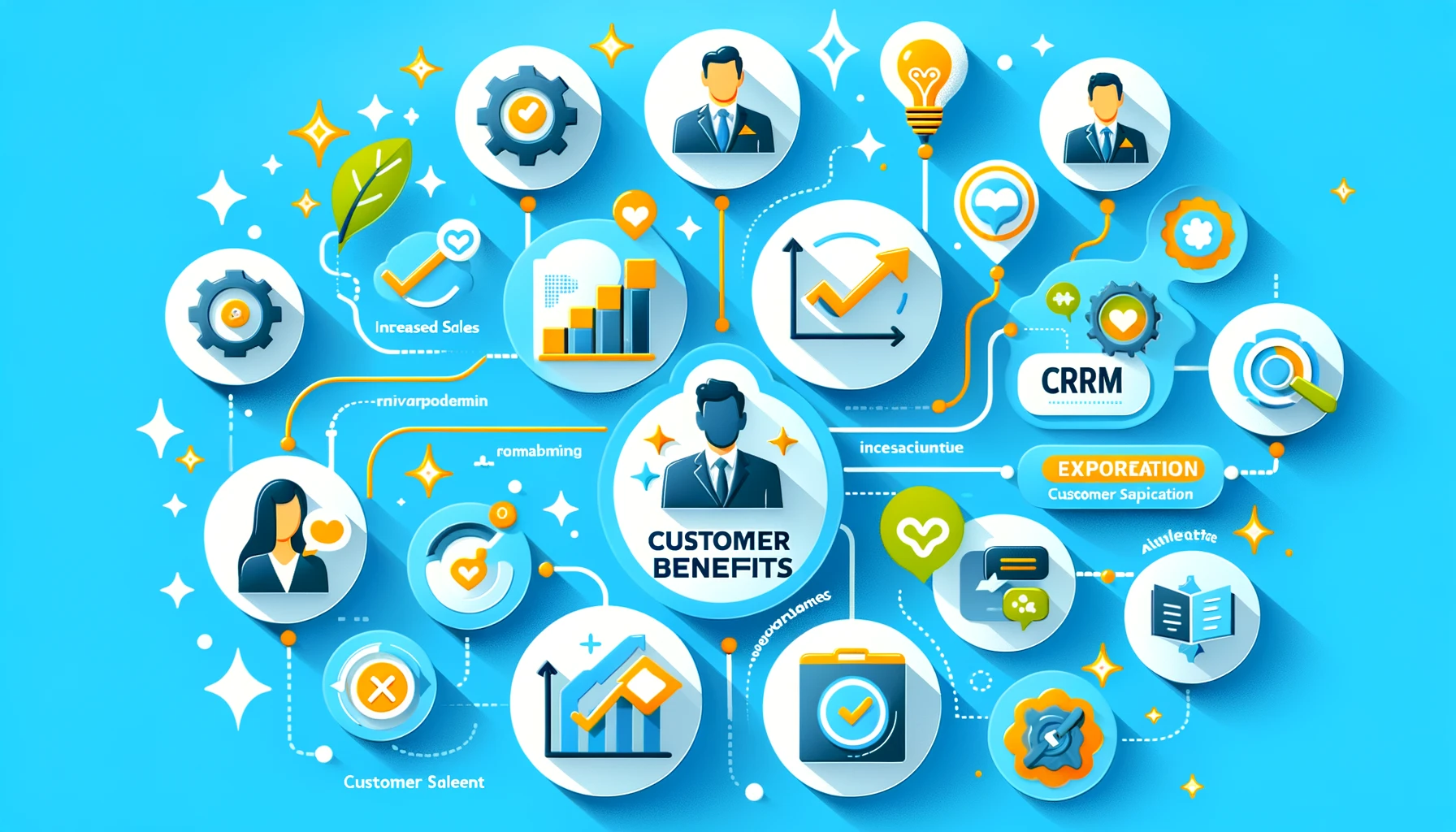Unlocking Growth: Why CRM is Important for Modern Businesses

Discover why CRM is crucial for your business: Explore the transformative impacts of CRM on customer relations and sales efficiency.
Unraveling the Mystery: Why CRM is Important
The business environment today is more competitive than ever. Understanding the driving force behind this competition might leave you wondering why CRM is important. The answer lies in the heart of every successful business - its customers. Companies that prioritize customer relationships tend to thrive.

Customer Relationship Management (CRM) systems are not just tools; they’re game-changers. The secret lies in their ability to centralize customer data, streamline processes, and improve customer service. Here are some key reasons:
-
Improved Information Organization: With CRM, every bit of customer data is stored and organized systematically. This allows for easy access and analysis, enabling companies to understand their customers’ needs better.
-
Enhanced Communication: CRM systems ensure that every employee can provide the same high level of service by having access to the same customer data.
-
Increased Efficiency: CRM systems automate tasks, freeing up time for employees to focus on more strategic tasks.

Consider a company that implemented a CRM system. Before implementation, their order processing time was 24 hours, and their order error rate was 10%. After implementing a CRM, these figures dropped to 8 hours and 2% respectively.
| Metric | Before Implementation | After Implementation | Improvement |
|---|---|---|---|
| Order Processing Time (hours) | 24 |
8 |
-66% |
| Order Error Rate (%) | 10 |
2 |
-80% |
This clearly illustrates how a CRM system can significantly improve business operations.
In conclusion, the importance of CRM in modern business success cannot be overstated. It’s an investment that offers substantial returns - improved customer relationships, more efficient operations, and ultimately, business growth.
The Game-Changing Impact of CRM on Business Success
In the fast-paced world of business, the ability to adapt and evolve is key. A crucial element of this evolution is understanding the pivotal role of CRM systems. It’s not just about storing customer data, but about leveraging it to create a more personalized customer experience and drive business growth.
The transformative impact of CRM on business success is multi-faceted. It not only enhances operational efficiency but also empowers businesses to nurture stronger customer relationships.
-
Personalized Customer Experience: CRM systems enable businesses to tailor their services to meet individual customer needs. This personalized approach can significantly enhance customer satisfaction and loyalty.
-
Data-Driven Decision Making: CRM provides valuable insights into customer behavior and preferences, enabling businesses to make informed strategic decisions.
-
Increased Revenue: By improving customer retention and driving customer acquisition, CRM systems can significantly boost a company’s bottom line.
Get started with ozma.io software
Let’s take a look at a scenario. An e-commerce company was struggling with high customer churn rates and stagnant sales growth. After implementing a CRM system, the company saw a 20% increase in customer retention and a 15% increase in sales within the first year.
| Metric | Before CRM | After CRM | Improvement |
|---|---|---|---|
| Customer Retention Rate (%) | 65 |
85 |
+30.8% |
| Sales Growth (%) | 10 |
25 |
+150% |

The numbers speak for themselves. CRM systems are no longer a luxury but a necessity in today’s competitive business landscape. They provide the strategic edge that companies need to stay ahead of the curve and ensure sustained business growth.
In light of these benefits, it’s clear as to why CRM is important. It’s not just about managing customer relationships, but about leveraging them as a strategic asset for business success.
A Closer Look at How CRM Works
Diving deeper into the world of CRM, it becomes clear that these systems are more than just databases. They are comprehensive platforms that help companies manage and analyze customer interactions throughout the lifecycle, with the goal of improving business relationships, assisting in customer retention, and driving sales growth.

The process begins with the collection of customer data across various channels. This can include a company’s website, telephone, email, live chat, marketing materials, and social media. CRM software collects detailed information on customers, including their personal information, purchase history, buying preferences and concerns.
Once the data is collected, the CRM system organizes this information to give you a complete record of individuals and companies, so you can better understand your relationship over time. This can reveal patterns and trends among your customers, helping you anticipate their needs and desires.
The CRM system doesn’t stop at collecting and organizing data. It also analyzes the data to provide businesses with valuable insights. These insights can inform a myriad of business decisions from sales forecasting to customer segmentation, and even product development.
For example, by analyzing purchase history, a company might discover that customers who buy product A are highly likely to be interested in product B. Armed with this information, the company can then develop targeted marketing strategies to cross-sell product B to all customers who purchased product A, potentially increasing sales.
In essence, the power of CRM systems lies in their ability to transform raw customer data into actionable business intelligence. By offering a deeper understanding of customers, CRM systems enable companies to deliver the right message to the right person at the right time, enhancing the customer experience and driving sales.

In the end, understanding why CRM is important is about recognizing the value of customer relationships and the need to manage these relationships in an organized and strategic manner. CRM systems provide a robust framework for doing just that, making them an essential tool in the modern business landscape.
Making Business Easier: The Practical Benefits of CRM
In the modern business landscape, the importance of efficient, streamlined operations can’t be overstated. That’s where CRM systems come in, offering a host of practical benefits to businesses of all sizes.

Centralized Data: With a CRM system, all your customer data is stored in one place. This makes it easy for your team to access and use it. No more searching through spreadsheets or email threads to find that one piece of information you need.
Automated Tasks: Many routine tasks, such as sending follow-up emails or updating contact information, can be automated with CRM. This saves time and reduces the risk of errors.
Detailed Reports: CRM systems can generate detailed reports on sales, customer behavior, and more. This can provide invaluable insights and guide strategic decision making.
Consider the case of a small business that was struggling to keep track of customer interactions. After implementing a CRM system, they were able to centralize their customer data, automate routine tasks, and generate detailed reports. This led to improved efficiency and a more personalized customer experience.
| Metric | Before CRM | After CRM | Improvement |
|---|---|---|---|
| Time Spent on Routine Tasks (hours/week) | 20 |
5 |
-75% |
| Customer Satisfaction Score (out of 10) | 6 |
8 |
+33.3% |
| Data Accessibility (%) | 60 |
95 |
+58.3% |
CRM systems are not just about improving operational efficiency. They also help businesses deliver a more personalized and satisfying customer experience. By keeping track of each customer’s preferences and purchase history, businesses can tailor their offerings and marketing messages to individual needs, resulting in a more engaging and relevant customer experience.
So why is CRM important? It’s simple. CRM systems make business easier, more efficient, and more customer-centric. They provide the tools and insights businesses need to stay competitive in the modern marketplace.
Real World Examples: CRM Transforming Businesses
In the realm of business, real-world examples often speak louder than theoretical discussions. This is particularly true when understanding why CRM is important. To illustrate, let’s delve into the transformative role of CRM in two different businesses.
One of our clients, a retail firm, was facing a challenge with customer retention. They had a large customer base, but their customers were not returning for repeat purchases. After implementing a CRM system, they were able to track customer behavior and preferences. This led to more personalized marketing strategies and improved customer service. Consequently, their customer retention rate improved by 25% within a year.

| Metric | Before CRM | After CRM | Improvement |
|---|---|---|---|
| Customer Retention Rate (%) | 60 |
85 |
+41.7% |
In another instance, a manufacturing company was struggling with inefficiencies in their sales process. This was due to a lack of coordination among their sales team, leading to missed opportunities and duplicated efforts. Upon integrating a CRM system, the company was able to streamline their sales process by organizing customer data and tracking sales activities. This resulted in a 15% increase in sales and a 20% reduction in sales cycle time.
| Metric | Before CRM | After CRM | Improvement |
|---|---|---|---|
| Sales Growth (%) | 10 |
25 |
+150% |
| Sales Cycle Time (days) | 30 |
24 |
-20% |
These examples vividly illustrate the transformative potential of CRM systems. By providing a centralized platform for customer data, CRM systems enable businesses to enhance customer relationships, streamline operations, and drive growth. It’s clear that having a CRM system isn’t just a luxury, but a necessity for businesses to stay competitive in today’s dynamic market.
Getting Started with CRM: A Simple Guide for Success
Stepping into the world of CRM can be overwhelming, but it doesn’t have to be. Here’s a straightforward guide to help you navigate your CRM journey successfully.
Identify Your Needs: The first step is to pinpoint what you want your CRM to accomplish. Are you looking to improve customer service, streamline sales, or gain deeper customer insights? Your goals will guide your choice of CRM.
Choose a CRM That Fits: Not all CRM systems are created equal. Some are geared towards large corporations, others towards small businesses. Ensure the CRM you choose aligns with your business size, industry, and specific needs.
Train Your Team: A CRM system is only as good as the people using it. Invest in training to ensure your team can effectively use the CRM to its full potential.
Keep It Updated: Regularly updating customer information in your CRM is crucial. This ensures that all data is current and accurate, enhancing the effectiveness of your CRM.

Once upon a time, a business was struggling with customer engagement. After following these steps, not only did they successfully implement a CRM system, but they also saw a 30% increase in customer engagement. Here’s a quick snapshot:
| Metric | Before CRM | After CRM | Improvement |
|---|---|---|---|
| Customer Engagement Rate (%) | 50 |
80 |
+60% |
Embarking on your CRM journey can be a game-changer for your business, enhancing customer relationships, boosting efficiency, and ultimately driving growth. By understanding why CRM is important and following these simple steps, you’ll be well on your way to CRM success.
FAQs
-
How Do CRM Systems Enhance Customer Engagement in Modern Businesses? CRM systems offer advanced tools for tracking and analyzing customer interactions, enabling businesses to tailor their approaches and build stronger, more personalized relationships with customers, crucial in the digital age.
-
What Impact Does CRM Have on Operational Efficiency? By centralizing customer information and automating routine tasks, CRM systems streamline business processes, reduce manual effort, and increase overall operational efficiency.
-
How Can CRM Drive Sales Success in Today’s Competitive Market? CRM tools provide valuable insights into customer behaviors and preferences, allowing businesses to develop targeted sales strategies, improve lead conversion rates, and ultimately drive sales success.
-
Is CRM Integration with Other Digital Tools Beneficial for Businesses? Integrating CRM with other digital tools, such as marketing automation and analytics platforms, creates a cohesive ecosystem that enhances data accuracy, streamlines workflows, and provides a holistic view of the customer journey.
-
Can Small Businesses Benefit from Implementing CRM Systems? Absolutely. CRM systems are scalable and can significantly benefit small businesses by organizing customer data, improving customer service, and providing insights that inform strategic decisions, even with limited resources.
Read more about low-code platform ozma.io
CRM for Beginners: Easy to Start!
CRM for Photographers: More Clients and Efficiency



